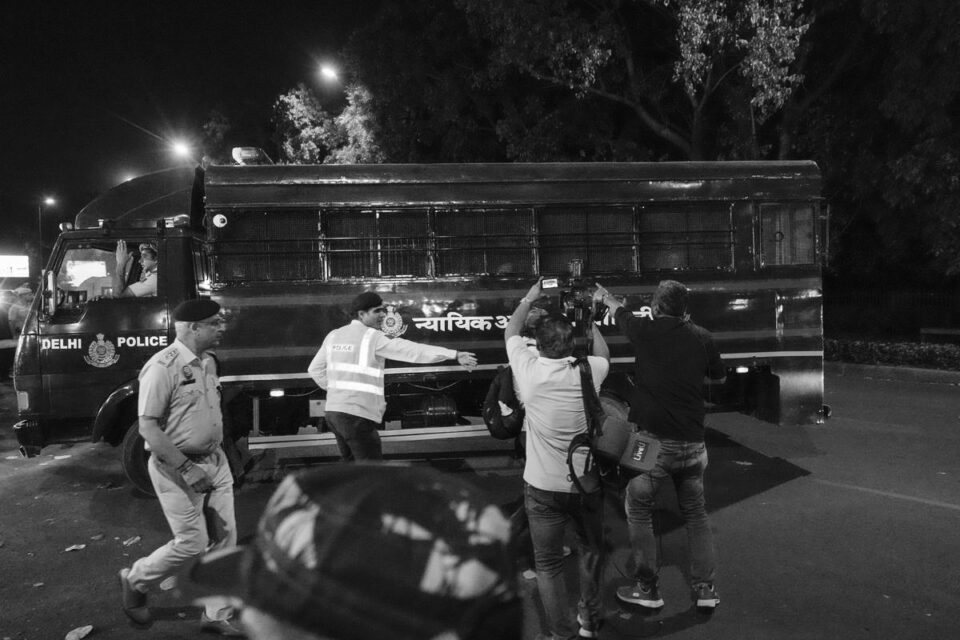Tahawwur Rana, a Canadian national and key co-conspirator in the 26/11 Mumbai terrorist attacks, has been successfully extradited from the United States to India, as confirmed by the National Investigation Agency (NIA). Rana arrived in Delhi on Thursday, and preparations are underway for his court appearance at Patiala House Court, where security has been significantly heightened. The area is under heavy surveillance, with Delhi Police and paramilitary personnel conducting thorough checks to ensure no disturbances occur.
Tihar Jail authorities have made arrangements to keep Rana in a high-security prison ward, pending the court’s directives. Indian law enforcement is preparing for an exhaustive interrogation of Rana, coordinating efforts meticulously to uncover details related to the attacks. A meeting held on Wednesday evening included senior officials such as Union Home Minister Amit Shah, National Security Adviser Ajit Doval, and External Affairs Minister S. Jaishankar, finalizing a comprehensive security and questioning strategy for Rana’s arrival.
Given the sensitivity of the case, it is anticipated that Rana’s remand will be conducted in-camera to address associated security risks. Officials acknowledge the challenges of interrogating Rana, as he has previously been the subject of extensive investigations. Extracting information from him may prove difficult, with concerns that he might mislead investigators or create confusion, indicating that the interrogation process is likely to be time-consuming.
Rana will be interrogated by a specially formed team comprising members from the NIA, two intelligence agencies, and forensic psychologists specializing in counterterrorism and criminology. Their primary goal is to uncover the connections between the 26/11 attacks and the individuals and organizations responsible for orchestrating them from abroad.
The confirmation of Rana’s extradition occurred on Tuesday night in Los Angeles, when the US Supreme Court dismissed his final appeal. Subsequently, the US Bureau of Prisons updated his custody status, indicating that he was no longer in their care as of April 8, 2025. Reports indicate that Rana’s extradition was facilitated by a surrender warrant signed by DIG (NIA) Jaya Roy, with an Indian team escorting him from Los Angeles to Delhi after a brief stop.
India had to provide assurances to the US regarding Rana’s safety, legal rights, and compliance with international human rights standards during his imprisonment. Upon his return to India, law enforcement agencies will focus on unraveling connections between the terror group Lashkar-e-Taiba (LeT), Pakistan’s intelligence apparatus, and various key individuals who have evaded capture for years. Investigators are particularly keen on obtaining insights from Rana about notable LeT leaders such as Hafiz Saeed, Zaki-ur-Rehman Lakhvi, Sajid Mir, and Illyas Kashmiri of HuJI, all of whom are believed to receive protection from the Pakistani government.
Tahawwur Rana, a 64-year-old Pakistani-born Canadian national, is notably recognized as a close associate of David Coleman Headley, a key figure behind the 2008 Mumbai terror attacks. Rana’s extradition to India followed his unsuccessful attempts to evade it, culminating when the US Supreme Court denied his application to remain in the United States.
In connection with Rana’s extradition, significant steps have been taken by the Indian government. A late-night notification from the Union home ministry has appointed advocate Narender Mann as the special public prosecutor for the trial associated with Rana. This trial is linked to the National Investigation Agency (NIA) case RC-04/2009/NIA/DLI, focusing on the Mumbai attacks. Mann is empowered to represent the NIA in Delhi’s Special Courts and Appellate Courts for a period of three years or until the trial concludes, whichever occurs first. This appointment underscores the Indian government’s commitment to addressing the issue of terrorism and ensuring accountability for those involved in such heinous acts.
The ramifications of Rana’s extradition could be significant, as it may yield essential intelligence regarding the operational frameworks and affiliations of terrorist organizations linked to Pakistan. With interrogations of Rana underway, his potential testimony could be crucial in taking necessary actions against those individuals who have previously avoided justice, largely due to the complexities surrounding cross-border terrorism and the geopolitical factors at play.
This entire situation reflects India’s continued efforts to tackle terrorism and its sponsors, aiming to enhance judicial proceedings that hold culpable parties accountable for their actions in the 2008 Mumbai attacks. The designation of Advocate Narender Mann as the special public prosecutor is part of this broader strategy to ensure that justice is served in a case that has had long-lasting impacts on both India and international counter-terrorism endeavors.
The formal announcement of Mann’s appointment, made through a gazette notification from the Ministry of Home Affairs, affirms the government’s resolve to utilize the National Investigation Agency Act, 2008, and the Bharatiya Nagarik Suraksha Sanhita, 2023, to facilitate this trial. Mann’s role comes during a critically important period, as the NIA seeks to present a robust case against Rana while simultaneously gathering insights that could broaden the scope of their investigations into terrorist networks.
In summary, Tahawwur Rana’s extradition represents a key moment in India’s fight against terrorism, promising the potential for crucial advancements in understanding and dismantling terrorist networks connected to the Mumbai attacks. The Indian government’s strategic legal moves, led by the appointment of a dedicated special public prosecutor, are imperative steps toward justice and deterrence against future terrorist activities.

